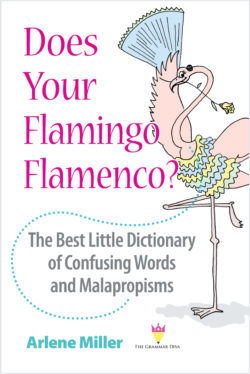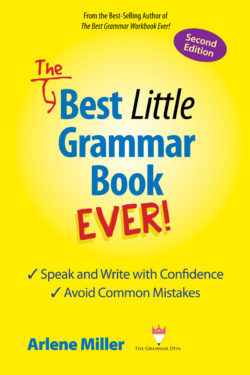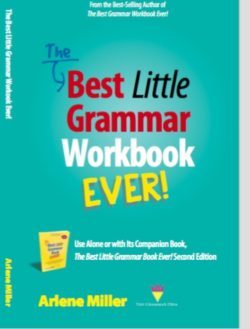Arlene Miller's Blog, page 44
August 17, 2017
I’m Appositive
 An appositive is a word or phrase that comes after (usually) a noun or pronoun to further explain it. Check out these two sentences:
An appositive is a word or phrase that comes after (usually) a noun or pronoun to further explain it. Check out these two sentences:
My neighbor, a Bostonian, has been in California for six years.
My neighbor, who is a Bostonian, has been in California for six years.
Both of the above sentences mean exactly the same thing, and they are both written correctly. The first sentence uses an appositive (a Bostonian), and the second sentence uses a clause (who is a Bostonian — a clause because it has both a subject, who, and a verb, is )
It is just matter of choice which way you want to write a particular sentence.
We have discussed previously in this blog (probably numerous times) essential versus nonessential clauses. Well, appositives are also essential or nonessential, which is why sometimes there are commas around an appositive and sometimes there aren’t.
Here are some sentences with appositives:
My mother, Gina, works for the school department.
The dog running down the street belongs to my friend.
The book on the top shelf was written by my aunt.
My brother Ed is running for mayor.
My brother, Ed, is running for mayor.
Let’s look at the commas (or lack thereof) in those sentences.
If you say your mother, we know you are talking about your mother, and we assume you have just one, so we know whom you mean. Her name is additional information and is not essential to the meaning of the sentence. Therefore, Gina is set off with commas.
We don’t know which dog belongs to your friend. You are identifying the dog by saying it is the one running down the street. It limits the dog you are talking about and is essential to the meaning of the sentence. Take it out and the sentence is unclear. Yes, there might be instances where that phrase might be nonessential (you are both watching the dog running down the street, in which case you might say, That dog, running down the street, belongs to my friend), but I think we can safely say the phrase is taken to be essential in that sentence.
Pointing out the location of the book you are talking about is essential to the meaning of the sentence. Which book is written by your aunt? The one on the top shelf. That sentence also assumes there is only one book on the top shelf. Otherwise, further description is required.
Sentence 4 is the same as sentence 5 except for the commas. Both sentences are correct in certain situations, but they imply different things. In sentence #4 there are no commas around Ed. Therefore, Ed is essential to the sentence. Why would Ed be essential to describing your brother? (Answer: You have more than one brother, so you need to clarify which brother you are talking about here.)
Now that you have read the previous explanation, you know why there are commas here. You have only one brother, and his name is Ed. Therefore, his name is additional information and not needed for the meaning of the sentence.
Most people do not pay attention to the distinction between #4 and #5, and usually no one notices and everyone understands. But just in case you want to be precise . . .
Does Your Flamingo Flamenco? is FREE on Kindle Friday, August 19 and Saturday, August 20.
Five copies of the print version of Does Your Flamingo Flamenco? will be given away on Goodreads. Sign up here for the giveaway!
August 14, 2017
Conciseness!
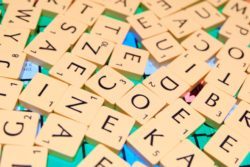 Today we finish the three Cs with Conciseness. We have already discussed Consistency and Clarity in previous posts. They do overlap. Consistency and conciseness both help clarity. And clarity is what we are striving for in both our written and spoken communication.
Today we finish the three Cs with Conciseness. We have already discussed Consistency and Clarity in previous posts. They do overlap. Consistency and conciseness both help clarity. And clarity is what we are striving for in both our written and spoken communication.
Here are some ways to make your writing more concise.
You don’t need to use long words when a short one will do just fine. We are not asking you to write like a first grader, but short words actually have more punch.
Following along with #1, short sentences also tend to be stronger and more effective than longer (and often meandering) ones. It is best to vary sentence length — some short, some medium, some long. Sentences that are all the same length tend to make writing choppy.
Nominalizations add unnecessary words and weaken writing. What is a nominalization? Look at this sentence: The committee will hold a meeting to conduct a discussion about new equipment. Now look at this sentence: The committee will meet to discuss new equipment. Why say hold a meeting when you can simply say meet? Why say conduct a discussion instead of simply discuss? Nominalizations are the taking of a simple action verb and turning it into a longer and weaker noun phrase.
Wordiness in both writing and speaking is the antithesis or conciseness. Wordiness includes filler words and phrases, excess verbiage (see #5), and redundancy (see #6). When people speak, they sometimes like to use words to fill space, hold the floor while they think, or make those to whom they are talking feel stupid.
Uh, so, well, and you know are sometimes used to fill space while the speaker thinks of what to say next. And some people like to add a phrase to the end of what they are saying to make you feel kind of stupid: Understand? Do you know what I mean? Did you get that? Right? “
Excess verbiage includes wordy phrases in both writing and speaking. Wordy phrases can begin sentences: What I did is . . . What this means is . . . The reason is because . . . and even the double is (oh, horror!): What I did is is . . . Other wordy phrases include the fact that . . . and that being said . . .
Redundancy will add unnecessary words to your writing and speech. Here are some common redundancies:
7 a.m. in the morning instead of just 7 a.m.
close proximity instead of just close
immediate vicinity instead of just near
small in size instead of just small
in order to instead of just to
at this point in time instead of now
as yet instead of just yet
collaborate together instead of just collaborate, which implies together
due to the fact that instead of just because
each and every instead of just each or every
personal opinion instead of just opinion
I would appreciate it if you would instead of just please
Grammar Diva News
Just finished three successful days at the Sonoma County Fair in Santa Rosa. The new Does Your Flamingo Flamenco? was quite popular! Must be the cute cover? It is now available on Kindle as well as in paperback. Check out all our books on Amazon: it is back to school time! If you do have a Grammar Diva book, we always appreciate a review on Amazon or Goodreads — and it doesn’t have to be long! Thank you!
August 4, 2017
Clarity!
 Welcome to the second C (last week we talked about Consistency) in the series of three (what will it be next week?). In this post, we discuss clarity.
Welcome to the second C (last week we talked about Consistency) in the series of three (what will it be next week?). In this post, we discuss clarity.
The whole purpose of speaking and writing is to communicate. The most important thing about communicating is understanding what is being said or written. Clarity is important; otherwise communication doesn’t work well.
A couple of obvious roadblocks to clarity are long, complicated sentences and fifty-cent words when a twenty-five cent, or even a ten-cent, word will do. Let’s talk specifically about three problems that can get in the way of clarity.
Unclear antecedents: Mary waved at Jennie as she drove by. Who was driving? Did Mary drive by Jennie and wave? Or did Mary wave as Jennie drove by? We can’t tell whom she refers to. She is a pronoun that refers to someone previously mentioned in the sentence. Whomever she refers to is its antecedent. As Jennie drove by, Mary waved. There. Fixed. Words such as it, this, and which often have unclear antecedents, so be careful when you write. Sometimes we might start a sentence with it or this, and whatever it or this refers to is a sentence — or maybe more than a sentence — back, leaving the reader confused. Same with which: I have several ideas for the dance theme and who will provide the refreshments, which I will talk to you about later. Not too clear.
Subject and verb too far apart. The committee, which is made up of people from a variety of occupations, and which meets several times a year to determine what the priorities of the department should be for the next year, and even several years beyond that in many cases — at least recently — is drawing up its agenda for the next meeting. This particular example is not difficult to wade through — there are much worse — but you get the idea. The subject of the sentence is committee, and the verb is is drawing. There is too much information between them. Often, by the time you get to the action word (verb), you have forgotten what the subject is, and you have to look back to find it. Don’t make your reader work that hard. I am not saying that the subject must always be directly followed by the verb, but there is rarely a reason to put that much information between them.
Misplaced and dangling modifiers. Repaired and freshly painted, I picked up my car from the body shop. They called to tell me my car would be ready on Thursday. It is generally best to put words near other words they go with. Who or what was freshly painted and repaired? It appears that it was I, not the car. Did the shop call on Thursday? Was the car ready on Thursday? Both? I picked up my car, repaired and freshly painted, from the body shop. They called on Thursday to tell me my car would be ready that afternoon. Fixed.
Grammar Diva News
See you at the Sonoma County Fair!
I will be at the Sonoma County Fair, along with other Redwood Writers, selling my books, doing readings, and giving tips – 11 a.m. to 6 p.m. on Saturday August 5; Friday, August 11; and Sunday, August 13. Come on down and say HI!
Does Your Flamingo Flamenco?– Now available on Amazon and Kindle!
SaveSave
SaveSave
SaveSave
July 27, 2017
Consistency!
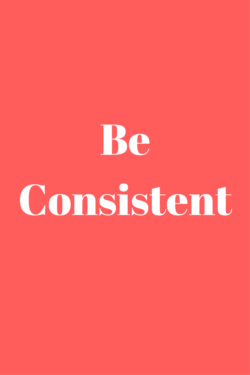 I always rewrite the very beginning of a novel. I rewrite the beginning as I write the ending, so I may spend part of morning writing the ending, the last 100 pages approximately, and then part of the morning revising the beginning. So the style of the novel has a consistency.
Joyce Carol Oates
I always rewrite the very beginning of a novel. I rewrite the beginning as I write the ending, so I may spend part of morning writing the ending, the last 100 pages approximately, and then part of the morning revising the beginning. So the style of the novel has a consistency.
Joyce Carol Oates
One thing that copyeditors look for when editing a manuscript is consistency. Why? Consistency makes your book (or whatever you are writing) look pulled together–and as if you know what you are doing. What do I mean by consistency?
I was copyediting a book a couple of weeks ago. In one sentence the writer used the Oxford (series) comma. In the very next sentence, which also contained a series, the author didn’t use the Oxford comma. Although I prefer using the Oxford comma, it is really the author’s choice, so I will just go with whatever the author uses for the first series I see. I will make the rest of the series the same: either comma or not. Yes, there is of course an exception: if a series is confusing, I will add or delete the Oxford comma regardless of how the other series are done. I really don’t understand why a writer would choose to use the comma in one sentence and not in the next. Maybe the author isn’t thinking of commas as much as I am! Here is an example:
I have so many things to do today. I need to go to the bank, pick up the kids from school, get to the library before it closes, and definitely get to the grocery store. We are completely out of bread, eggs, milk and several other necessities.
Here are three other important things (in my opinion) to keep consistent:
Hyphens. Some compound words are hyphenated. Others are written as two separate words. Yet others are run together as one word. Sometimes a word changes over time. Take the word web site. Or is it web-site? Or website? Well, we can probably agree that it is website. However, website is a relatively new word in our language. It often happens that a new word begins as two separate words, and as it becomes more common, it becomes hyphenated, and then as it becomes everyday language, it is written as just one word. I see e-mail and email, e-book and ebook. Does it matter which way you write it? Then there are the compound modifiers: one-term senator, two-story building, etc. Most of the time you can’t find a compound modifier in a dictionary. And words like e-mail might be hyphenated in one dictionary and written as one word in another. What to do? What to do? Pick a way to write it, and stick with it. It is better to pick a way–even if it isn’t the preferred way — and stick to it than to keep changing from one way to another. Being inconsistent gives the appearance you really don’t know what you are doing. Consistency gives the appearance of a plan.
Capitalization. We all know the capitalization rules. And there are so many of them. And sometimes, there just is no real answer as to whether or not something should be initial capped or not. Or maybe you have some reason to capitalize something just because. Be consistent with the capitalization. Pick one way and stick to it for the same use of the same word. Inconsistent capitalization can be jolting to a careful reader.
Parallel construction. What is that? It is more of a grammatical/writing quality issue that is a more organic type of consistency. It is actually “incorrect” to write without parallel construction. Parallel construction is the use of the same construction for similar elements in a sentence. Here is a very simple example of a sentence that is NOT parallel: We went to the pool, to the mall, and saw a movie. Parallel: We went to the pool, to the mall, and to the movies. A little more complex example of a sentence that is not parallel: My boss said, “You will be getting a promotion, receiving a sizable raise, and your responsibility will increase.” Here is how to write it in a parallel way: My boss said, “You will be getting a promotion, receiving a sizable raise, and assuming more responsibility.”
Consistency is one of those aspects of your writing that make it look “finished.”
Grammar Diva News
Don’t miss the Sonoma County Fair if you are local! Redwood Writers will be selling books, giving readings, and providing you with tips of all kinds every day of the fair in the EC Kraft Building. I will be there with my books — at special prices, of course– on Saturday, August 5; Friday, August 11; and Sunday, August 13 from 11 a.m. to 6 p.m. Please come by and say Hello!!!
My new book is now available on Amazon. It is also now available for preorder on Kindle right here!
Is it buck naked or butt naked? Lay or lie? Compliment or complement? You will find over 250 confused word pairs, word groups, and idioms, presented alphabetically with examples and definitions.
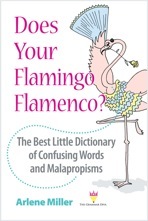
SaveSave
SaveSave
SaveSave
SaveSave
SaveSave
SaveSave
July 20, 2017
Well, I Feel Good: “Well” and “Good” Untangled

I am good.
I am well.
The cake is good.
The candy tastes good.
I did well on the test.
She is a good tennis player.
She plays tennis well.
I feel well.
All of the above sentences are correct in their use of well and good. The main difference between the words is that good is an adjective (and they generally describe nouns), and well is an adverb (and they usually describe verbs, or sometimes adjectives or other adverbs).
Here is why all the above sentences are correct.
Good book. Good is an adjective in its usual place, right before the noun it modifies.
I am good. If you have a “linking” verb, which is a verb that connects the word before it with the word after it (it serves as an equal sign), you use an adjective after it, not an adverb. Good doesn’t describe am; it describes I (I = good). The most common linking verb is the “to be” verb; some of its common forms are am, are, is, were, was, have been, will be. But the “to be” verb must be the only verb. If you say, “He was walking,” walking is the verb, not was. (Was is an “auxiliary,” or “helping,” verb here). Compare a linking verb to an action verb: I read a book. Read is not connecting I and book (I do not equal a book). I read well. Here, well is describing how you read, so you use an adverb.
I am well. Hmmm….so if #2 is correct (I am good), how is I am well also correct? If you say, “I am good,” it is often in reference to how you feel. The explanation for why you use good in the sentence is in #2. However, well is acceptable after the “to be” verb if it refers to a state of health. So, they are both correct.
The cake is good. Here is another example of using the adjective after the “to be” verb.
The candy tastes good. You would never say, “The candy tastes well.” In addition to “to be,” the sense verbs are also sometimes linking verbs: look, smell, taste, feel, sound. See the comparison of these verbs as linking verbs and action verbs after #9 below.
I did well on the test. Well is an adverb describing how I did (action verb did.)
Good tennis player. Good is an adjective modifying tennis player after the linking verb is.
She plays tennis well. Well is an adverb describing the action verb plays. How does she play?
I feel well. This is pretty much the same as I am well. Feel is a linking verb because it is a sense verb here. However, well means a state of health here, so it is fine to use, even though it is generally thought of as an adverb. Here is a really an adjective. (Note that well can also be a noun – Timmy fell into the well – and even an interjection – Well! What have we here?
Comparison of action verbs and linking (sense) verbs:
I am looking at the cake vs. The cake looks good.
I smell smoke vs. The brownies smell good.
I taste the salt in the chocolate vs. The chocolate tastes good.
I feel my cat’s soft fur vs. The breeze feels good.
I sound the whistle to get their attention vs. That music sounds loud.
——————————————————————————————
Grammar Diva News
Does Your Flamingo Flamenco? will be available on Amazon (and soon everywhere else) in a couple of days.
I will be selling my books and giving readings and grammar tips at the Sonoma County Fair in Santa Rosa, CA on August 5, 11, and 13 from about 11 a.m. to 6 p.m. I will be part of the Redwood Writers tables inside the EC Kraft Building. All my books will be for sale, including a special back-to-school (or college or new job) package including the above three books at a special price: the grammar book, the grammar workbook, and the book of confusing words. If you are local, I hope to see you there. There will be many great authors and books for sale! (Well, the authors won’t be for sale, but the books will be!)
SaveSave
SaveSave
SaveSave
SaveSave
SaveSave
SaveSave
July 15, 2017
Who Wants to Be a Lexicographer?
Who wants to be a lexicographer? I do! 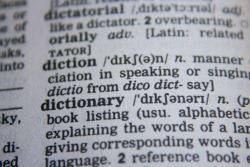
What is a lexicographer? A lexicon is a workbook or dictionary; or the vocabulary of a language, person, specific field, or social class. Graph, of course, means writing. So, a lexicographer is someone who writes the dictionary.
We tend to take dictionaries for granted. When we need one, it is there, all up to date and correct — whether it is printed or online. But dictionaries were not handed down from Mount Sinai all completed. Someone — or some people, to be more precise — had to write them. Someone had to come up with the definitions of all the words, as well as the pronunciations and the etymology, or where the words come from.
I don’t do many book reviews on this blog, but if you are interested in words and language — and if you are reading this blog, I assume you are one of those word people — I think you will love the book I just finished and am going to talk about today.
There are lots of books about words and language. There are grammar books like the ones I write. There are textbooks. There are humorous books. You may have read some of these popular books on language:
The Grammar Girl’s Quick and Dirty Tips for Better Writing
Eats Shoots and Leaves
Woe Is I
Confessions of a Comma Queen
Fifty Shades of Grammar and my other books!
And there are many, many more.
Recently, a reader of mine suggested a book to me: Holy Sh*t: A Brief History of Swearing by Melissa Mohr. It sounded fascinating, so I borrowed it from my local library and dug in. Yuck. How can you make a book with this title boring and tedious? I don’t know, but I couldn’t get through it, as much as I wanted to. I looked at the online reviews: most people liked it; a few felt the way I did — that she made an interesting topic boring. So I am not recommending that book, although you may like it.
But I am recommending Word by Word: The Secret Life of Dictionaries. The author is Kory Stamper, a British lexicographer for Merriam-Webster. What a great read! The book seems to be mostly about written dictionaries. The amount of care, thought, and rigorous updating doesn’t seem to apply as much to the “click generation,” as it is called in the book. In fact, when she was completing the book, which has a 2017 copyright date, the author said that there was a big layoff at Merriam-Webster.
Here are just some of the things she talks about — in language that is inviting and easy to understand:
As one would assume, lexicographers are not known for their skill at small talk. The office is very quiet.
People often get annoyed when a definition contains the word that is being defined. We are not supposed to do that, are we? Well, read about why it is done, and how the word surfboard was handled.
Bitch was a real bitch to define with all its meanings — and trying to make the meanings accurate.
The English language is messy and illogical. You have probably discovered that by now. It is a democracy: use something enough in a certain way, and the dictionary will add it. If the language didn’t change, it would be a dead language. Think Latin.
There are new words appearing all the time. Which ones are added? How often is the printed dictionary updated? How long does an update take? You know, they update only certain letters each time. And they keep notes of new and expanded meanings that are kept in a file; there could be hundreds of update notes for a single word.
Oh, yes, there are arguments and complaints. One was about the word decimate. We take it to mean “completely destroy,” but what about the root dec, which means “ten”? The word originally meant “to kill off one tenth.”
French and Spanish have official language academies. Does English? Why not? Well, the academies don’t prevent the French and Spanish speakers from using whatever words they want; and the American Heritage Dictionary has created a usage panel for English.
Merriam-Webster decided to add dates-of-first-use to definitions. That was a separate job from defining. Imagine the research that took! And of course, people would write in with claims of earlier dates they had discovered. In fact, people have written in claiming that they themselves were the first to coin a particular word. The lexicographers and daters found that those claims were for the most part untrue.
You may make fun of LOL and LMAO, figuring they are not legitimate enough to include in a dictionary. However, initialisms have been around a long time. What about ASAP and RSVP?
The pronunciation (or pronunciations) or words is a whole other issue! Word by Word devotes several pages to the pronunciation of nuclear. And why nucular might be OK.
Who would have thought that a word like marriage would begin a huge controversy? You can see where I am going with this. The definition of marriage has changed. What about same sex marriage? How do you define marriage now? How do you define marriage when same sex marriage is legal in some places, but not in others? How do you prevent people from writing in and complaining that their dictionary is taking a political stand? That is a can of worms that is discussed in Word by Word. (And Supreme Court justices have the habit of using dictionaries to make a point.)
You can imagine that most of the mail lexicographers receive are to point out mistakes. Rarely will anyone write and tell the dictionary is has done a fine job on something.
The bottom line is still to make a profit. And, of course, technology has had an effect on the painstaking work that lexicographers have done in printed dictionaries that were manually updated and reprinted, rather than just uploaded.
What does a lexicographer do when laid off? To what are those skills transferable?
I think you might enjoy Word by Word by Kory Stamper.
You might also enjoy this book, which will be available in about a week on Amazon, maybe sooner (ebook will be available for Kindle presale very soon, and the print book will be available everywhere else soon too):
SaveSave
SaveSave
SaveSave
SaveSave
July 6, 2017
Which and That (and Who) Explained
Which, that and who. These are pronouns that are often confused.

We aren’t talking about sentences like these:
Which of these toys are yours?
That book is mine
Who is that girl?
We’re talking about sentences like these:
I am taking the flight that leaves at midnight.
My boss, who is a great athlete, plays tennis every day.
That green dress, which was on sale, matches my eyes.
In the second list of sentences, that, which, and who function as a special type of pronoun (relative pronoun). These pronouns begin clauses (groups of words with a subject and a verb) that generally describe a noun.
(I am taking the flight) that leaves at midnight – describes flight.
(My boss) who is a great athlete – describes boss.
(That green dress) which was on sale – describes dress.
Some of the “rules” pertaining to that, which, and who are pretty black and white; others are grayer.
Black and white:
Which and that are used for things and animals.
Who is used for people and animals with names.
Which is used for nonessential, or nonrestrictive, clauses; that is used for essential, or restrictive, clauses.
Commas are used around nonessential clauses (which).
Gray:
Sometimes you can leave out that. When?
Sometimes you can use that with people. When?
Rule #1 Black and White: Use which for nonessential (nonrestrictive) clauses and that with essential (restrictive) clauses.
A nonessential (nonrestrictive) clause is added information that does not affect the meaning of the sentence. These clauses begin with which (or who) and are enclosed in commas. An essential, or restrictive, clause is necessary to the meaning of the sentence and begins with that without any commas.
My twin sister, who is good at math, helps me with homework all the time. You don’t really need the words inside the comma. We already know we are talking about your twin sister, of whom there is only one.
My sister who is good at math helps me with homework all the time. Here, the lack of commas implies that you might have more than one sister, and we are talking about the sister who is good in math. The clause is essential, or restrictive, here. You are defining which sister you are talking about.
The Hobbit, which I have read three times, is also a movie. Here, the fact that you have read it three times is extra information and not necessary to the meaning of the sentence.
The book that is on the front desk is mine. Here, you need the clause that is on the front desk to identify the book you are talking about. It restricts the book to the one on the front desk.
Rule #2 Black and White: Use that and which for things, and who for people and animals with names.
The girl who always sits in the back of the room is my best friend.
The cat that is sitting on the ledge belongs to my neighbor.
Moe, who is my bulldog, is four years old.
That dog, which is a chihuahua, has been at the shelter for months. (Actually this is kind of gray. No one will mind if you call this dog a who.)
Shades of Gray
Sometimes you can leave that out of your essential (restrictive) clause:
1.Usually after a form of the verb say: He said (that) he was going to Europe.
But you can’t do that if there is a time difference between now and when it was said:
The teacher said on Wednesday we will have a test. You need that.
Does this mean
The teacher said that on Wednesday we will have a test.
The teacher said on Wednesday that we will have a test.
When you put that in, whichever one you mean becomes clear. Without that, it is ambiguous.
2. That is usually good to use after certain verbs including (but not limited to) declare, estimate, contend, point out, propose, state:
I declare that there is a problem.
I estimate that the chair is four feet wide.
She contends that she was here early.
I would like to point out that you have chores to do.
She proposed that a new rule be adopted.
He stated that he did nothing wrong.
3. It is usually wise to use that before clauses that start with words like after, before, until, and while:
She said that after they are finished, they will meet us.
I know that before dinner she had been out shopping.
She said that until she was in third grade she couldn’t read.
He thought that while the game was on, he could take a nap.
Remember that it is always correct to leave that in. So when in doubt, use it.
Another Shade of Gray
Usually we use who for people. If you are talking about a type of people or an organization, you generally use that (or which). However, if you are really referring to the people inside the organization, you can use who.
The tribes that are native to this area are listed here.
The School Board that was just elected will meet tonight.
The School Board, who has helped us out with our fundraisers many times, is here tonight.
A Final Thought
That doesn’t have a possessive, so weird as it might sound, use whose with people and things:
The desk, whose drawers are missing, is being donated to the school.
The dog, whose litter mates have all been adopted, needs a good home.
Grammar Diva News
It’s almost ready!!
My new book contains over 250 confusing word pairs, groups, and phrases, presented alphabetically with cross references — easy to use! It will be available on Amazon and all other online retailers in late July (?), and will be on Kindle as a presale soon.
SaveSave
SaveSave
SaveSave
SaveSave
SaveSave
SaveSave
July 1, 2017
Hacked
I am not sure which e-mail account of mine was hacked, but apparently one of them was. So if you received any strange e-mails, hopefully you didn’t click. If you received one, I apologize.
June 29, 2017
Independence Day!
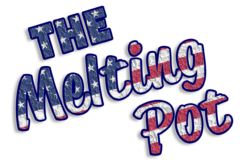
Tuesday, July 4, is of course Independence Day. I hope you have a good holiday weekend — and that it lasts for four days! Next week we will get back to grammar, but this week is the annual Independence Day post. Here are some quotes about topics we are reminded of on July 4. I hope some of these quotes will resonate with you, and that you can find comfort in some of them as well.
Independence
“Those who won our independence… valued liberty as an end and as a means. They believed liberty to be the secret of happiness and courage to be the secret of liberty.” Louis D. Brandeis
“In America we have a Declaration of Independence, but our history, our advancements, our global strength all point to an American declaration of interdependence.” Cory Booker
“The bedrock of our democracy is the rule of law and that means we have to have an independent judiciary, judges who can make decisions independent of the political winds that are blowing.” Caroline Kennedy
“Men say they love independence in a woman, but they don’t waste a second demolishing it brick by brick.” Candice Bergen
“There is no more independence in politics than there is in jail.” Will Rogers
“Without moral and intellectual independence, there is no anchor for national independence.” David Ben-Gurion
“Freedom of religion is a principle that is central to our Nation’s Declaration of Independence. Congress has taken this positive step to protect our freedom to express allegiance to America’s flag and the ideals it represents.” Ron Lewis
“The independence of the United States is not only more precious to ourselves but to the world than any single possession.” Henry Cabot Lodge
Patriotism

“And so, my fellow Americans: ask not what your country can do for you – ask what you can do for your country. My fellow citizens of the world: ask not what America will do for you, but what together we can do for the freedom of man.” John F. Kennedy
“Let every nation know, whether it wishes us well or ill, that we shall pay any price, bear any burden, meet any hardship, support any friend, oppose any foe to assure the survival and the success of liberty. ” John F. Kennedy
“The history of liberty is the history of resistance. The history of liberty is a history of the limitation of governmental power, not the increase of it.” Woodrow Wilson
“Patriotism is supporting your country all the time, and your government when it deserves it.” Mark Twain“Patriotism is love of country. But you can’t love your country without loving your countrymen and countrywomen. We don’t always have to agree, but we must empower each other, we must find the common ground; we must build bridges across our differences to pursue the common good.” Cory Booker
“Patriotism consists not in waving the flag, but in striving that our country shall be righteous as well as strong.” James Bryce
‘It is our conduct, our patriotism and belief in our American way of life, our courage that will win the final battle.” Prescott Bush
“True patriotism hates injustice in its own land more than anywhere else.” Clarence Darrow
“Fighting corruption is not just good governance. It’s self-defense. It’s patriotism.” Joe Biden
“Real patriotism is a willingness to challenge the government when it’s wrong.” Ron Paul
America
“America’s greatest strength, and its greatest weakness, is our belief in second chances, our belief that we can always start over, that things can be made better.” Anthony Walton
“There is nothing wrong with America that cannot be cured by what is right with America.” Bill Clinton
“America has never been united by blood or birth or soil. We are bound by ideals that move us beyond our backgrounds, lift us above our interests and teach us what it means to be citizens.” George W. Bush
“The business of America is not business. Neither is it war. The business of America is justice and securing the blessings of liberty.” George F. Will
“I’m not going to quit. Why should I quit? This country is worth fighting for.” Hillary Rodham Clinton
“I believe America’s best days are ahead of us because I believe that the future belongs to freedom, not to fear.”John Kerry
“Either the United States will destroy ignorance or ignorance will destroy the United States.” W.E.B. Du Bois
Freedom
“Freedom has its life in the hearts, the actions, the spirit of men and so it must be daily earned and refreshed — else like a flower cut from its life-giving roots, it will wither and die .” Dwight D. Eisenhower
“Here is my advice as we begin the century that will lead to 2081. First, guard the freedom of ideas at all costs. Be alert that dictators have always played on the natural human tendency to blame others and to oversimplify. And don’t regard yourself as a guardian of freedom unless you respect and preserve the rights of people you disagree with to free, public, unhampered expression.” Gerard K. O’Neill
“Those who expect to reap the blessings of freedom, must, like men, undergo the fatigue of supporting it.” Thomas Paine
“We must be free not because we claim freedom, but because we practice it.” William Faulkner
“The contest for ages has been to rescue liberty from the grasp of executive power.” Daniel Webster
Independence Day
“The second day of July, 1776, will be the most memorable epoch in the history of America. I am apt to believe that it will be celebrated by succeeding generations as the great anniversary festival…. with pomp and parade, with shows, games, sports, guns, bells, bonfires, and illuminations, from one end of this continent to the other, from this time forward forevermore. You will think me transported with enthusiasm, but I am not. I am well aware of the toil and blood and treasure that it will cost us to maintain this Declaration and support and defend these States. Yet, through all the gloom, I can see the rays of ravishing light and glory.” John Adams
The United States is the only country with a known birthday. All the rest began, they know not when, and grew into power, they know not how…. There is no “Republican,” no “Democrat,” on the Fourth of July — all are Americans.
James Gillespie Blaine
Thank you to these three websites for the quotes! Great websites to check out for a quote.
June 22, 2017
Are You Composed? Compose vs. Comprise
“Hmmm….Should I use compose or comprise? What is the difference?”
Yes, these two words are confusing indeed. They mean the same thing, but are used differently. Much of the time it is easier to just give up and use a substitute word or phrase.
Comprise means “is made up of.” So the whole comprises the parts. In other words, when using comprise, the whole will come before the parts:
The United State comprises fifty states. (The United States is made up of fifty states.)
The class comprises second, third, and fourth grade students.
The penguin family in the photo comprises four members.
Compose means “to make up.” The parts compose the whole. So here, the parts will come before the whole:
Fifty states compose the United States.
Second, third, and fourth graders compose the music class.
Four penguins compose the family seen in the above portrait.
Now, we can try to”flip” the words around into a sort of a passive-sounding usage is composed of, which can be used in place of comprise. Here, the whole is composed of the parts:
The United States is composed of fifty states. (comprises fifty states)
The music class is composed of second, third, and fourth graders. (comprises second, third, and fourth graders)
The penguin family is composed of mother, father, and two children. (comprises a mother, a father, and two children)
Don’t worry about flipping comprise around because you can’t. “Is comprised of” is not a thing, so don’t bother with it. Here are the three correct ways to say it:
The department comprises a manager, an assistant manager, and four salespeople.
The department is composed of a manager, an assistant manager, and four salespeople.
A manager, an assistant manager, and four salespeople compose the department.
Of course you can avoid it: The department is made up of a manager, an assistant manager, and four salespeople.
So get “is comprised of” out of your lexicon. It isn’t correct.
Tips to remember which is which:
Comprise contains eight letters; compose contains seven letters. Comprise is longer.
When comprise is used, the whole (larger) comes before the parts.
Compose is shorter; when it is used the parts ( smaller) come before the whole.
The above tips are when the verb is used in the active voice.
The more passive-sounding phrase “is composed of” is used instead of comprises and means” is made up of.”
The other passive-sounding phrase, “is comprised of” is not used.
Grammar Diva News
The Grammar Diva presents …Does Your Flamingo Flamenco? The Best Little Dictionary of Confusing Words and Malapropisms is nearly done. It will be going to the designers very soon. More updates later.


